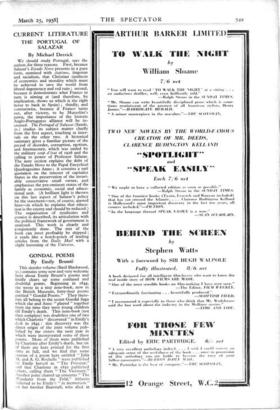CURRENT LITERATURE
THE PORTUGAL OF SALAZAR By Michael Derrick
We should study Portugal, says the author, for three reasons. First, because Salazar's Estado Novo presents in a pure form, unmixed with etatisme, jingoism and racialism, that Christian synthesis of economics and morality which must be achieved to save the world from liberal degeneracy and red ruin ; second, because it demonstrates what Franco in turn is aiming at (and therefore, by implication, shows us which is the right horse to back in Spain) ; thirdly, and contrariwise, because if Franco turns out, after victory, to be Mussolini's pawn, the importance of the historic Anglo-Portuguese alliance will be in- creased. The Portugal of Salazar (Sands, 5s.) studies its subject matter chiefly from the first aspect, touching at inter- vals on the other two. A historical summary gives a familiar picture of the period of disorder, corruption, egotism, and freemasonry, which was ended by the military coup d'etat of 1926 and the calling to power of Professor Salazar. The next section explains the debt of the Estado Novo to the Papal Encyclical Quadragesimo Anno ; it contains a naif quotation on the interest of capitalist States in the preservation of the invari- ably conservative small owner, and emphasises the pre-eminent status of the family as economic, social and educa- tional unit. (A brilliant light is thrown on this last aspect of Salazar's policy by the statement—not, of course, quoted here—in which he explains that educa- tion is the enemy and should be reduced.) The organisation of syndicates and gremios is described, its articulation with the political framework of government is analysed. This work is clearly and competently done. The .rest of the book can most profitably be skipped ; it reads like a hotch-potch of leading articles from the Daily Mail with a slight leavening of the Universe.










































































 Previous page
Previous page